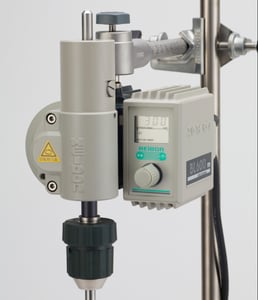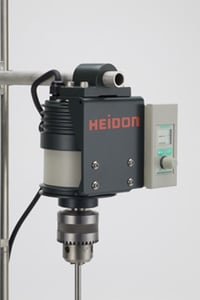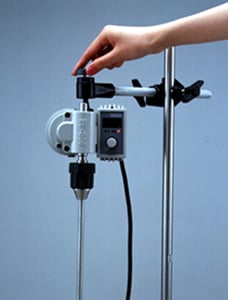 A good laboratory mixer can make all the difference in your finished product, whether that be paper, polymer, chemicals, food or other substances.
A good laboratory mixer can make all the difference in your finished product, whether that be paper, polymer, chemicals, food or other substances.
It can also impact the safety of your team and your lab as well. With lower-quality mixers, mixing products with dangerous chemicals and high viscosity can damage or stress the motor, which creates a potential fire hazard, and a sub-par, poorly mixed finished product.
A mixer is necessary to make certain chemical reactions happen in paper-making and chemical mixing. Polymers depend on consistent mixing for an even blend and a strong bond.
But the wrong mixer can quickly wear out, or its motor just may not be up to the task if you’re dealing with a thick, heavy consistency. As these lower quality motors wear, they need service, or worse - total replacement.
So how can a high-quality mixing system keep your team safe and improve your product? Let’s take a look.
Pulp-Mixing and Paper Making
The high-torque motors in our laboratory mixers make them perfect for mixing pulp, to make paper products while they are in development and during quality assurance testing. Paper pulp is incredibly viscous and hard to mix, which can be problematic when you want to create a smooth, even consistency, and a great paper.
However, this thick, hard-to-mix pulp mixture is no match for the high-torque capabilities of our mixers, which will provide consistent mixing, without the risk of an overheated motor.
A laboratory mixer is also chemically crucial to the paper-developing and testing process. You need a powerful mixer on the manufacturing floor, and this is no different in a small-batch or lab setting when you are developing your product on a smaller scale. Many steps are taken to remove a naturally-occurring wood chemical called “lignin,” including the heating and bleaching of the tiny wood particles found in pulp.
However, one of the most important steps in breaking down and removing lignin from the paper-pulp is the mixing process.
Lignin is broken down through continuous mixing. And this is vital to the overall outcome of your final paper product; the more lignin that is removed from the pulp, the stronger the bond will be, and the stronger the paper.
As the final product is being tested and developed in a lab setting, or evaluated later for quality assurance, you need the same mixing power of a larger manufacturing plant, but on a much smaller scale. A quality lab mixing system ensures that you have the same processing power and reliability of a larger mixer. It provides consistency in the process; your lab tests will be conducted using a mixer with the same strength the product will see in production, which means you can trust your results in the lab.
Mixers are also key to ensuring that the pulp comes evenly in contact with chemicals like bleach as the paper is produced. Not only does this affect the color and consistency of the pulp, but it’s also necessary for breaking down the lignin in the wood particles used to make paper. Without a laboratory mixer that works reliably (like ours!), you can’t ensure that you are developing a quality finished product.
Polymer Production
No matter the viscosity, our lab mixers can reliably and evenly mix polymers to a consistent, homogenous blend. Our unique reciprocating models automatically raise and lower as they mix, which makes them perfect for eliminating “ring layers” of different additives. This reciprocating action ensures that the entire batch of each manufactured polymer is mixed evenly throughout.
In the development of many polymers, particle additives are mixed in to boost the stiffness, toughness, and strength of the polymer. Mixing in particles reduces how flammable a polymer may be, or how likely it is to ignite, making it a safer product with which to work.
This is only the case, however, if the particles are completely and thoroughly mixed, and with heavy and viscous polymers, having a laboratory mixer with a strong, unstoppable motor like the BL300Mx-10 is incredibly important to a thorough blend.
Polymers have to be thoroughly tested before they are ready for manufacturing or distribution. The process simulation of a polymer’s production is a crucial step in its development. Lab mixers that do not overheat and affect the polymer can provide the assurance that the polymer mixing is independent of other conditions that would damage product stability and add inherent defects.
Mixing Chemicals
Mixing chemicals can be a challenging, and sometimes even dangerous endeavor. If exposed to harsh chemicals, a low-quality mixer might be damaged as the seal that protects the motor degrades. But many chemicals require friction and the kinesthetic processes of a laboratory mixer in order to react the way you need them to.
So you need a high-quality laboratory mixer with a strong seal, that won’t be affected by the chemicals it’s mixing.
Stirring and mixing chemicals can even increase the speed of certain chemical reactions, because it increases the chance of particle collision. This boosts reaction rate, which means chemical reactions happen more quickly, saving you time, while still providing you with the chemical reaction process you need.
Our mixing systems provide smooth operation so that chemicals are mixed exactly the way they are supposed to be in order to get the right reaction, while still protecting the chemically-resistant seal for the motor. This means the chemicals do not cause damage to the motor or pose a risk of fire or ignition. A current-limiter circuit prevents overheating, sparking, motor failure, or shorting, making the three-one motor in our mixers the safest available to protect you, your team, and your product.
A low-quality laboratory mixer doesn’t just affect the quality of your final product or your initial tests, when mixing chemicals, a lesser mixer might just create a safety risk as well. Our mixers are designed to last, to stay sealed, and to keep you safe.
Designed with Safety & Excellence in Mind
We have only the highest-quality mixers to ensure the safety of you and your team, as well as the safety of your lab. Many laboratory mixers have motors that can create sparks as they operate, which, as a result of the volatile chemicals and substances being used, can easily cause a fire to ignite.
The motors used in our “three-one motors” are what we call “brushless motors.” These motors have been specially designed to avoid sparking, nearly eliminating the risk of fire from sparking.
The motor is also entirely encased, with little opportunity for air or other elements to enter the motor and create issues, or start a fire. If particles are able to get into the motor, they can wear away at important mechanisms and shorten the life of your motor or decrease its effectiveness.
Not only does this present safety issues, like a motor shorting out, overheating, or not working, but it means your laboratory mixer would need to be replaced more frequently.
Additionally, these mixers are in a class of their own; they are designed with consistency and ease of use in mind. As the viscosity of solutions change, our lab mixers maintain their speed. You never have to worry about consistency with these mixers, and you don’t need a technician or scientist to carefully monitor the entire process; you can trust that it simply works. Also? The torque these mixers generate is top-notch. They are powerful beyond compare for their compact size and stand up to even the toughest of mixtures.
Much of the work that needs to be done in the papermaking, polymer, and chemical industries simply cannot be completed without a reliable laboratory mixer at each stage of development and testing. Do you trust yours?
Let’s make sure your mixer is helping you achieve the highest-quality end result possible. Contact us today and let’s talk about how dramatically our mixers can improve your final product.



